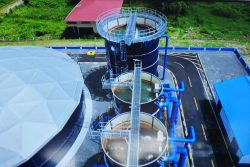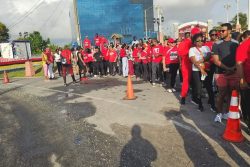Dear Editor,
I wish to reply to the letter captioned “Will Iwokrama ever be self-sustaining?” (07.01.20).
I deeply regret that too few people know about Iwokrama’s significant and invaluable scientific achievements since its foundation ten years ago and too little about the financial pressures the Centre has faced in recent years as international donors have diverted their funding to other pressing causes, such as international poverty, disease, crime and terrorism. Our budget is cut to the bone; salaries are low (almost half of what they were in the early years) and benefits are in line with government levels; and staff numbers minmal. All our employees work their socks off. We do not carry high cost international consultants on our payroll. Those who do work for the Centre either give their time free or at cost. But thanks to the generosity of the Commonwealth Secretariat, the support of the Guyana Government and the loyalty of the local communities, Iwokrama has managed to keep its doors open. We are proud of that.
At a time of increasing concern about climate change and its impact on the international community, including Guyana, Iwokrama is now able to move into the international spotlight. The recent Stern Review reported that deforestation around the world contributes 18 per cent to global greenhouse gas emission – more than the whole of the global transport sector; and that, unless prompt action is taken between now and 2012, the resulting increase in atmospheric CO2 levels will be bigger than the culmulative total emissions from the aviation sector since the invention of the aeroplane. So stopping deforestation is crucial. But even if we do life still has to go on. Human activity cannot just stop as a consequence.
Because of its priceless ten years of scientific work, Iwokrama already possesses a large scale pilot sustainable forest management project able to demonstrate that poverty reduction, maintenance of environmental balance in forests and sustainable economic development are not contradictory but can be reconciled and even made mutually reinforcing. So all that quiet work behind the scenes and early donor investment has not been wasted; instead an extensive knowledge base has been built. Iwokrama will now be able through its expertise, shared with others around the world, to make available one potential and early solution to mitigating climate change.
But in this harshly competitive world, which extends to international donor funding, the Centre still has to be financially independent. Money for climate change research does not grow on trees, even though their value as a carbon sink may be increasing. With the encouragement of our Patron the Prince of Wales and the continuing support of the Commonwealth Secretariat, the Government of Guyana, the British Government and other donors such as ITTO and KfW, and following months of hard work and investment advice in London, the Director General and I will be announcing early next month in Georgetown at a public forum how we intend to take forward Iwokrama’s original mandate and to earn income from four financially self-sustaining businesses to pay our bills. The trustees wish to end dependence on others.
By 2010 the trustees intend that Iwokrama should be an international brand in the fight to achieve stabilisation in climate change, as well as regarded in Guyana, in the region and internationally as a centre of excellence, of which the Guyanese people will be justly proud. The more people that come to Iwokrama to see what we are doing and to support us the better.
The last ten years have been a long hard road with many ups and downs in order to reach this point. But because of that it is an even better story to tell. I urge as many as possible to go to the Iwokrama Centre and find out more about what we do.
Yours faithfully,
Edward Glover
Chairman, Board of Trustees
of the Iwokrama International Centre







